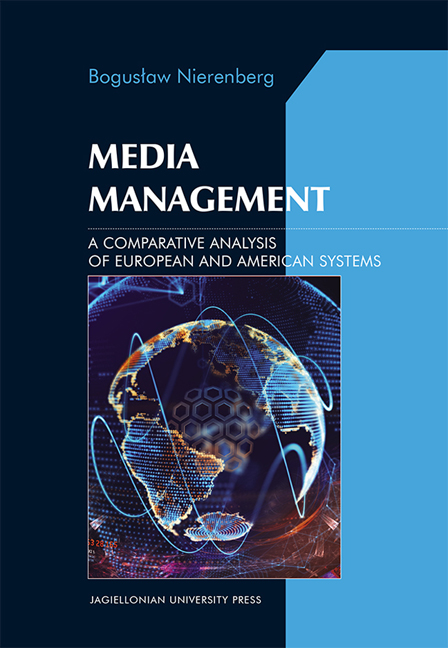Chapter 3 - The Essence of Media Management - Dual Nature of the Media
from Part 1
Published online by Cambridge University Press: 10 January 2018
Summary
Media organizations constitute the basis of a media market. The nature of such organizations differ from other enterprises, taking into account their dual nature [Picard 1989]. The analysis included in this chapter shall connote previous concepts as well, referring to pre-systemic interpretations. However, the systemic analysis of media organizations in a management context will to serve as the basic concept.
Media management in historical and methodological contexts
Research concerning media management primarily has its roots in the United States. The research was related to the rise of huge media concerns, firstly the printing press, and then radio and television concerns. For Alan B. Albarran the need for researching the areas connected with media management lies in the uniqueness of the media industry. For every society, the media are the main supplier of information and entertainment [Albarran 2006: 3]. John M. Lavine and Daniel B. Wackman [1988: 7] identifi ed fi ve characteristic features that distinguish the media from all other industries:
The media deliver “perishable” products.
The media employ highly creative workers.
The media have a distinct organizational structure.
The media play a socially-substantial role (they have an effect on audience consciousness, may serve as a tool of influence, etc.).
The differences among traditional media become bleared.
Even considering the unique character of the media, research pertaining to media management has been developing in a historical context just like other disciplines. Currently, the research is of a global and interdisciplinary nature to a large extent, just as are contemporary media. However, Albarran [2006: 3] propounds that media management should be perceived through previous research accomplishments. This kind of review of basic currents in management was performed previously, in Chapter 1. Nevertheless, one ought to recall at this point that making use of the output of American researchers requires specific knowledge relative to the US market and its historical conditioning, which infl uenced the shaping of notions referring to management.
Widely, management is associated with commercialism and with profitoriented organizations.
- Type
- Chapter
- Information
- Media ManagementA Comparative Analysis of European and American Systems, pp. 57 - 72Publisher: Jagiellonian University PressPrint publication year: 2016

